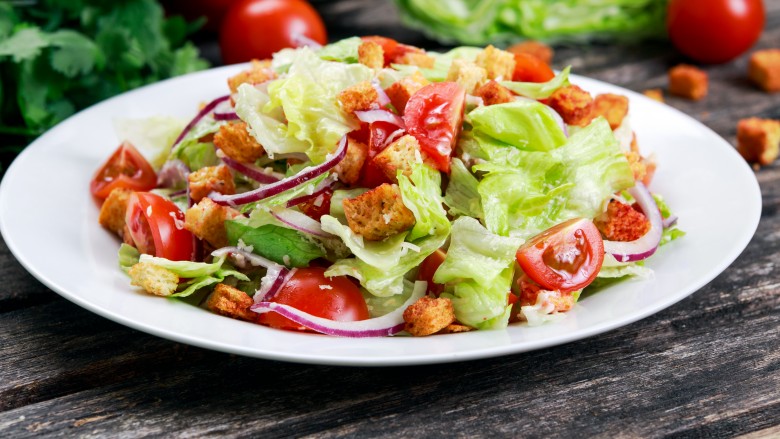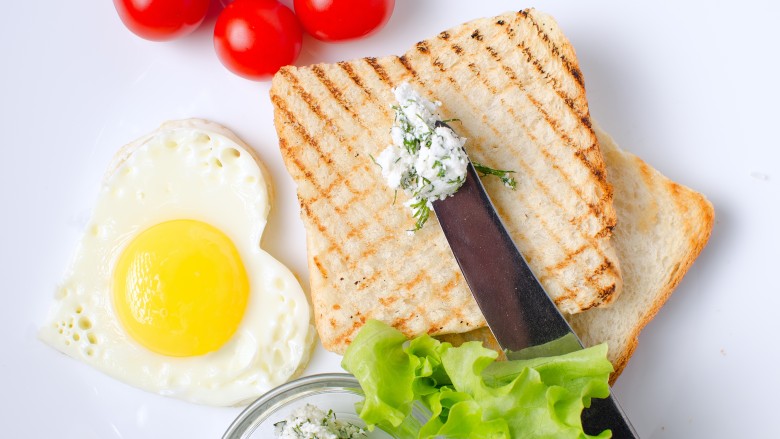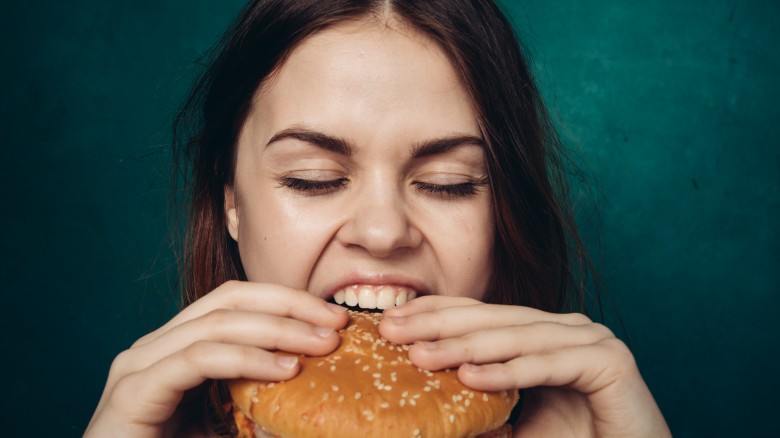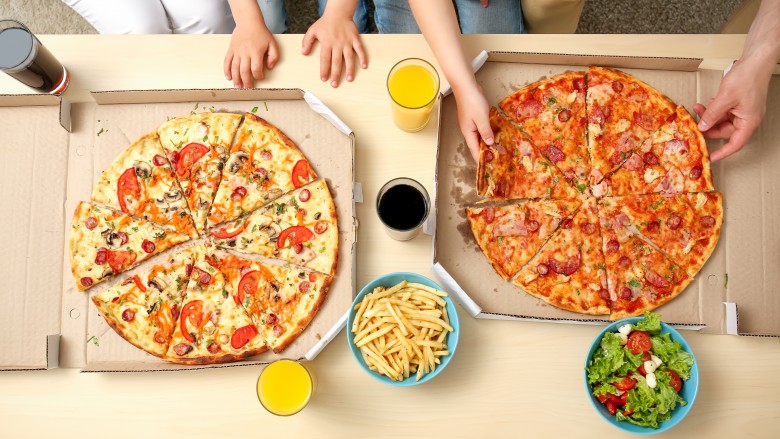Reasons You're Not Losing Any Weight
Losing weight seems like an easy enough concept. If we eat less and exercise more, the pounds should melt off like a popsicle on the Fourth of July, right? Well, maybe for some people. But if you're anything like me, then you know this losing weight business isn't easy. In fact, sometimes it can feel darn near impossible.
If you've been committed to a healthy lifestyle — counting calories, hitting up the gym — but still aren't seeing that number on the scale budge, don't give up just yet.
I recently chatted with a few experts and it turns out, there are a ton of different factors that come into play when it comes to weight loss. The good news is that sometimes making a few small adjustments may be all you need to break through your plateau.
Here are 10 common weight loss mistakes and what you can do to fix them.
Skipping out on sleep
Whether you're staying up late studying, working on your side hustle or binge watching Stranger Things on Netflix, missing out on much-needed Zzz's could be stalling your weight loss. "Sleep is crucial for our health," Dr. Caroline Apovian, director of the Nutrition and Weight Management Center at Boston Medical Center, told me. "Adults who sleep 5-7 hours per night (or less) are 30-80 percent more likely to develop cardiovascular disease, hypertension, and type 2 diabetes, or to die prematurely, as those who sleep 8 hours or more."
She also explained that chronic lack of sleep increases cortisol (stress hormone) and ghrelin (hunger hormone) while simultaneously slowing down your metabolism and decreasing leptin (satiety hormone). "Cortisol prompts the body to replenish energy in the form of hunger pangs. This is why chronic lack of sleep is contributing to the obesity epidemic."
Dr. Donnica L. Moore, president of Sapphire Women's Health Group, agrees, saying, "When you don't get enough sleep, even for as few as four days, your body's ability to process insulin is decreased by as much as 30 percent. This change in insulin sensitivity decreases your ability to convert sugars and starches into energy, thus converting them into fat stores."
Bottom line: sleeping more won't help you lose weight, but sleeping too little will contribute to weight gain.
Stressing out
Between juggling our careers, our finances, our relationships and all the other little things in life, it's easy to end up with a mental to-do list that seemingly becomes longer by the second. But as much as we want to commit to every networking event, yoga class, and social gathering (while still remembering to text our mom once in a while), the stress that comes with trying to do it all can wreck major havoc on our weight loss goals.
"The stress hormone cortisol prompts your body to recover after stress through eating more," said Dr. Apovian. "The result: Hunger pangs and cravings, especially for sweet and fatty foods." She also explains that in addition to cravings, eating can feel soothing when you're stressed, which can often lead to a habit of emotional eating. "Manage your stressors, and weight loss becomes much easier,"she suggests.
Going too light on the protein
Loading up on salad every day may seem like a good idea when you're trying to lose weight, but relying solely on Iceberg lettuce as a food source can backfire when it comes to dropping lbs. "Our basal metabolic rate is primarily determined by the amount of lean muscle mass we have," explains Dr. Apovian. Without the proper amount of protein, our muscle mass diminishes. "As our muscles shrink, our metabolisms slow down," says Dr. Apovian. And with a slower metabolism, any excess weight is going to be harder to get rid of.
To make sure you're getting enough healthy protein in your diet, make sure to incorporate foods such as salmon, eggs, Greek yogurt and chicken into your everyday diet. Vegetarian or vegan? No problem. There are plenty of plant-based proteins to choose from including quinoa, legumes, tempeh and non-dairy milk, just to name a few.
Doing too much cardio
Running can be great exercise, but if you find yourself sweating it out on the treadmill multiple times a week while seeing minimal changes on the scale, you might need a little weight training in your life. "Many who are new to fitness only do cardiovascular exercises," Dr. Apovian told me. "Cardio burns calories and is excellent for heart health, increasing lung capacity, decreasing stress, and raising energy levels. However, relying on cardiovascular exercise alone not only burns fat, it also burns muscle."
She also notes, "Losing muscle mass contributes to a slower, compromised metabolism, and a softer, rounder shape. Muscle mass must be maintained and built up (especially as we age) in order to lose weight and keep it off." So next time you go to the gym, ditch the elliptical and try out something new like this beginner arm workout from PopSugar.
Overestimating the calories you burn at the gym
It happens to all of us. After one serious sweat session at the gym, we suddenly feel like it's okay to order that third happy hour margarita. But with an average of 250-500 calories per glass, according to Prevention, it's going to take way more than one Zumba class to offset the damage. "We tend to underestimate the amount we eat, and overestimate the amount we exercise," says Dr. Apovian. "The only way to be sure is to keep track."
Instead of consuming food mindlessly, she suggests writing down what you eat so that you can be more conscious of everything that's going into your body. "I love when my patients keep a food journal," she told me. "This is an incredibly successful weight loss strategy."
Skipping breakfast
I'll admit that I've been one to run out the door in the morning without as much as a drop of water in my system. I usually feel fine for a couple of hours before I'm so hungry, I'm desperately shoving money into the office vending machine ready to take down some pretzels, a bag of peanut M&Ms and maybe some Cheetos for later.
"Breakfast eaters tend to eat less later in the day," Jo Lichten PhD, RDN (a.k.a. "Dr. Jo"), told me in an email. She also added that according to the National Weight Control Registry, a database of successful dieters, people who eat breakfast tend to maintain weight loss more than those who skip it. Don't have time for an elaborate breakfast? Grab a yogurt or toss a bag of raspberries in your purse to eat on your way to work.
Cheat days
It's okay to indulge every once in a while, but hitting up the drive-thru after a long week (TGIF, right?) and religiously meeting your friends for brunch on "Sunday Funday" will only result in major setbacks when it comes to your weight loss goals. "Effective diets are sustainable long-term and result in gradual weight loss," said Houston-based psychiatrist Dr. Jared Heathman. "Frequent cheat days result in a barrage of calories that can be stored as fat, and this can counteract multiple days of adherence."
Instead of finding any excuse to ditch your diet, he suggests finding a plan that both healthy and enjoyable to you. This will make it easy to stick to for the long haul.
Eating a big dinner
If you're saving up all of your daily calories to use on dinner, you could be doing yourself a disservice. "Dinner is unique in that it often does not have time constraints. An abundance of time combined with family or friends often result in overindulgence in food," explains Dr. Heathman. "More calories are often consumed at dinner time, yet this meal has the least amount of time left to burn off calories before bedtime. This can result in food storage as we sleep."
Dr. Lichten also added that according to various studies, overweight individuals tend to eat the bulk of their calories during dinner and beyond.
Vitamin deficiency
Even if you're trying to eat a balanced diet, your body might still be lacking certain much-needed vitamins, which Dr. Scott Schreiber, a Delaware-based chiropractic physician, said could be impeding weight loss. "Vitamin D deficiency is rampant in modern society," he wrote to me. "Low vitamin D levels have been associated with weight gain and chronic diseases." He also mentioned that low levels of vitamin B could stall weight loss. "B vitamins are water soluble and are eliminated if the body does not have an immediate use for them," he said. "Stress and inadequate food intake are two common reasons why this occurs."
In addition to a maintaining a healthy, balanced diet, Dr. Schreiber suggests taking a multivitamin, as well as a vitamin D supplement to make sure you are getting all the nutrients your body needs.
Forgetting hydration
In addition to eating enough fruits, veggies and lean proteins, drinking water is an essential part of a healthy diet. "Water keeps your metabolism up and is critical for cellular functions," Dr. Vik Tarugu, a Florida-based board certified gastroenterologist, told me."In addition, it decreases hunger."
To make sure you're staying properly hydrated, Dr. Tarugu suggests drinking at least half a gallon of water per day, including one eight ounce glass before bed and one immediately after waking up.
Remember to enjoy the journey
Weight loss can be a challenge. Trust me, I can relate. But it's also important to remember that it's not just about the number on the scale, but rather embracing a healthier lifestyle.
Dr. Tarugu also reminds us to enjoy our journey toward weight loss and cut ourselves some slack from time to time. "Occasionally reward yourself with your favorite food in minimal quantities when you have reached your goal of weight loss for that work," he said. "It keeps you motivated."











